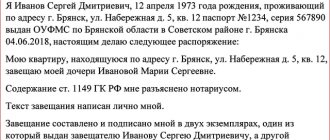1
One way to leave your property after death is to create a will. The owner can indicate absolutely any citizens in it, even those who are not related to him. There are open and closed wills - they differ not only in drafting, but also in the order of announcement. A closed will keeps the testator's last will secret until the envelope is opened. The heirs will not learn about their rights to property until the text of the deceased’s order is read to them.
Who keeps and makes public the will? What actions are required from heirs? This article is devoted to the procedure for announcing a closed will.
When is the will promulgated?
The announcement of orders left by the owner of the property is carried out by a notary in two cases: if the testator’s copy is lost or if the deceased has drawn up a closed document. The closed type of document implies complete confidentiality of the instructions left until the day of death of the testator.
The announcement procedure is carried out for relatives, specified recipients after the death of the testator. During the lifetime of the owner, the “secrecy of the will” applies.
According to the basic requirements for drafting, the paper is drawn up in two copies, one of which is kept by the owner, the second by the notary. You can find out the location of the notary who prepared the document at any notary office. It is enough to provide a package of documents and write an application to search for paper. The applicant will be issued a certificate indicating the address of the specialist who certified the document. Information about the preparation of a document is recorded through a unified notary register.
Documents compiled before the beginning of 2021 may not be recorded in the electronic system.
There are several principles that should not be violated by the text of the order: the interests of applicants for the allocation of a mandatory share must be taken into account, the order must fit within the framework of the law.
Errors in drafting may be grounds for challenging the order in court.
Who can become a testator
Every citizen with full legal capacity has the right to make posthumous orders. According to Russian legislation, this can be:
- an adult mentally healthy person (whose legal capacity is not limited or excluded by the court);
- emancipated teenager (the owner of bequeathed property aged 16 to 18 years, who, by decision of the guardianship and trusteeship authorities, is recognized as a full citizen capable of bearing responsibility for concluded transactions).
Other persons who are completely incapacitated or have limited civil liability are prohibited from disposing of future owners of personal property.
The procedure for probating a will
The announcement of a testamentary disposition takes place in the presence of heirs and witnesses after the death of the testator. The day of opening of the inheritance is considered the moment of death of the owner. To register property through a notary, six months are allocated from the date of opening of the inheritance.
In some cases, the court recognizes the death of the testator. In such cases, the opening date is considered to be the day the court decision comes into force.
The death of the testator can be reported by relatives, heirs appointed by the will, or the executor. A notary office specialist can contact applicants thanks to the coordinates left by the compiler. The information left during preparation may not be relevant at the time of opening of the inheritance. If the applicant has not expressed his desire to exercise inheritance rights within six months, the property may be subject to division between other applicants.
The notary has no right to disclose the contents of the document until the death of the testator. “Secrecy” is protected by law. This rule is of particular importance when opening closed documents.
Concealing the existence of a documentary order of the owner regarding the property may cause the applicant to be recognized as an unworthy heir.
We recommend reading: Rights of a spouse during inheritance
Customer Reviews
Gratitude from Marina Kuleshova I express my deep gratitude to Alexander Viktorovich Pavlyuchenko for his competent legal work and professionalism, as well as to his assistant Elena Vladimirovna for the qualified assistance provided. I wish you prosperity and achievement of professional heights.
Sincerely, Marina Kuleshova. 08/15/2018
Thanks to Mavrichev S.V. from Bars Dan A. I thank the wonderful Lawyer Sergei Vyacheslavovich Mavrichev for thorough, competent advice and human mutual assistance to all his clients who are in deep need of qualified and timely legal and psychological advice.
Leopard Dana A. 09/18/2018
Gratitude to Solovyov I would like to express my deepest gratitude and appreciation to Konstantin Vasilievich Solovyov for his attentive attitude and very competent consultation. And if I ever need legal support, I will definitely turn to him. I would also like to mention Daria Valentinovna Kutuzova, who greeted me with a smile and answered some of my questions. I wish the company success, further prosperity, and more clients.
Gratitude from Guryanova T.A. I express my sincere gratitude to Vasily Anatolyevich for his professionalism and highly qualified assistance in resolving the issue of protecting my rights as a consumer. As a result, I received decent compensation from.
Thanks a lot. 07/09/2019
Thanks to Kavaliauskas V.A. I would like to express my deep gratitude to Vasily Anatolyevich, an employee of your company, for his enormous support and competent defense of my case. And also for having a good attitude towards people. I will recommend your organization to all my friends and family.
I wish you success and prosperity,
05/14/2018
Review by Rychnikova G.V. I express my gratitude to your employee Andrey Valerievich Ermakov for providing me with legal assistance.
I also express my gratitude to Diana Sumarokova for her polite and tactful customer service and the very pleasant atmosphere in your office.
Gratitude to Pavlyuchenko I express my gratitude to Alexander Viktorovich Pavlyuchenko for the qualified management of my case, competent advice and informed decisions, which led to compensation for all claimed losses.
Best regards, Evgeny Nevinchany
Gratitude from Soboleva E.P. I would like to express my deep gratitude to Vasily Anatolyevich Kavaliauskas for his literacy, consultation and attention to the client who found herself in a difficult situation; as well as wonderful, sensitive administrators. I wish the company prosperity and good clients.
Sincerely, Soboleva Elena Petrovna. September 19, 2018
Review by B.I. Goreky Gratitude to Yuri Vladimirovich from B.I. Goreky for the consultation on family rights.
Gratitude to Konstantin Vasilievich Solovyov I am very glad that I was accepted for a consultation with Konstantin Vasilievich Solovyov. An excellent, very competent lawyer. Please accept my gratitude for your excellent service. Thank you!
Valadze G.G. 08/17/2018
Opening and reading of the will
The notary's office specialist must announce the procedure for dividing the bequeathed property. A notary opens a closed type of will according to a certain protocol. The notary must open the envelope with the closed will and reveal the secret of the last will of the deceased within two weeks after the death of the testator. During this time, a specialist from the notary’s office informs applicants about the appointed date for the announcement of the deceased’s order.
The opening and announcement procedure takes place on a strictly designated day. The procedure is as follows:
- The announcement takes place in front of all applicants;
- The notary reads the text of the order.
The envelope with the closed type of will is opened in front of all applicants. Before the paper reading procedure begins, passports are checked. The document remains in the custody of the notary.
Extraordinary circumstances
A document written under special circumstances does not require notarization . (Civil Code of the Russian Federation. Article 1129). A will is considered valid if:
- if a person writes it in a situation that is dangerous to his life.
- If, due to a special situation, it is impossible to make a simple certified will (how to make a will?).
If a person finds himself in one of the above situations, a will is drawn up according to the following rules:
- invite two witnesses to the procedure
- He must write this document in his own hand and put his personal signature.
- It is clear from the contents of the paper that it constitutes a will.
When a person dies after drawing up such a will, legal proceedings occur , which must confirm the existence of special conditions.
Then the will comes into force, but the heirs must have time to declare their rights, since not much time is given for this.
Attention! A will will lose its legal force if the person who wrote it remains alive after the termination of special circumstances. To prevent this from happening, you need to write a will within a month under normal conditions (or a closed one) and have it certified by a notary.
Opening and reading of a closed will
After the death of the owner, applicants must arrive at the notary's office on the appointed day. A specialist must read a closed will after checking the seals and signatures on the envelope, indicating the authenticity of the paper. The notary reads out the last will of the deceased according to a similar scheme.
When the text of the will is read out, a protocol is created. The protocol describes the terms of the order, the data of the applicants present, the notary's data, the amount of the state fee, the date of announcement, signatures, and seals.
A closed will can be made public only at the request of interested parties.
Entry into inheritance rights
According to the law, heirs submit an application to the notary authority within six months after the death of a relative. At this point, the notary notifies the relatives of the deceased about the existence of a will, and also explains how and when the will is announced after the death of the deceased. He schedules its opening, if it is a closed will, and its announcement 15 days after the heirs apply. The heirs have the right to contact the notary with a question about whether there is a will even immediately after death, but the latter can refute or confirm the fact of its existence, but not disclose the contents.
The very moment of assuming the rights of an heir involves submitting the following documents to the notary office:
- Passports;
- A document confirming and characterizing the degree of relationship with the deceased;
- A document confirming the death of a relative;
- Application for inheritance.
What to do after the will is announced
After the will is announced, interested parties can agree with the text of the document, prepare documents for entering into inheritance rights, and write statements of desire to exercise the right to receive a share.
Relatives may disagree with the contents of the document. Draw up a statement of claim to the court, attach a documentary substantiation of the reason to cancel the testator’s order.
The applicant has the right to refuse the allocated share, write a written refusal or ignore the inheritance procedure.
Entry into inheritance rights
According to the law, heirs submit an application to the notary authority within six months after the death of a relative. At this point, the notary notifies the relatives of the deceased about the existence of a will, and also explains how and when the will is announced after the death of the deceased. He schedules its opening, if it is a closed will, and its announcement 15 days after the heirs apply. The heirs have the right to contact the notary with a question about whether there is a will even immediately after death, but the latter can refute or confirm the fact of its existence, but not disclose the contents.
The very moment of assuming the rights of an heir involves submitting the following documents to the notary office:
- Passports;
- A document confirming and characterizing the degree of relationship with the deceased;
- A document confirming the death of a relative;
- Application for inheritance.





